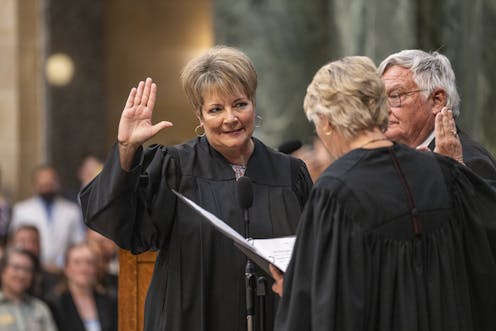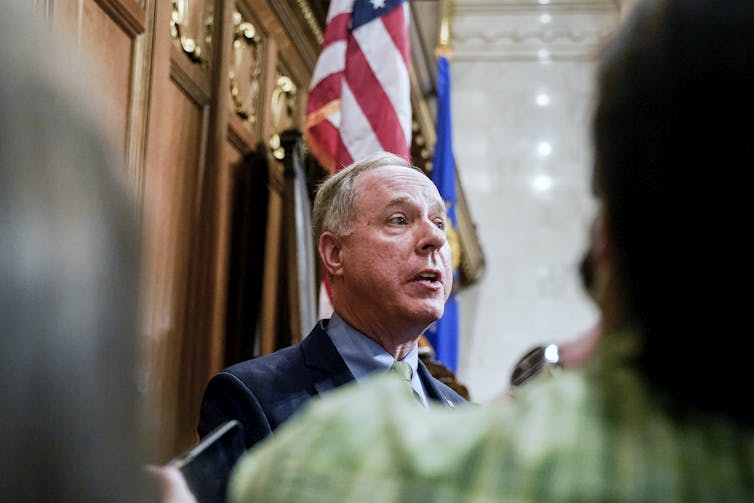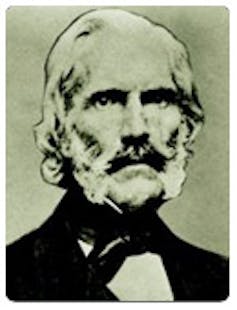Wisconsin GOP's impeachment threat against state Supreme Court justice is unsupported by law and wou
Impeaching a recently elected Wisconsin Supreme Court justice for conduct neither criminal nor corrupt would negate the people’s votes – and strike a blow at judicial independence.

Wisconsin’s April 2023 state Supreme Court election was historic. It was the nation’s most expensive judicial race ever, with over US$50 million in total spending, and it broke turnout records for an off-cycle spring election.
Janet Protasiewicz, a Milwaukee circuit court judge and self-described progressive, won an 11-percentage point victory, shifting the court’s ideological balance of power at a moment when major legal clashes over abortion and redistricting are looming.
Wisconsin’s Republican-controlled legislature is now demanding that Protasiewicz recuse from – that is, excuse herself from – considering two recently filed lawsuits that challenge the state’s legislative maps, which heavily favor the GOP, as unlawful partisan gerrymanders. They argue that she cannot be fair because during her campaign in the nonpartisan judicial race, she received millions of dollars from the state Democratic Party and criticized the state’s Republican-drawn maps as “rigged.”
For their part, the state Republican Party and its allies spent millions backing Protasiewicz’s opponent, who once defended a prior version of the maps in court.
Legislators are threatening to impeach Protasiewicz if she hears the cases.
As this controversy unfolds, it is important to know the law and practice of judicial recusal and impeachment in Wisconsin and beyond – a topic that we, as scholars of state courts and constitutions, have studied closely.
In short, recusal is rare, and impeachment is even rarer.

Judges rarely recuse based on campaign activity
The U.S. Constitution guarantees the right to an impartial judge. Additionally, every state has binding rules that prohibit judges from hearing cases involving situations deemed to pose an unacceptable risk of bias, such as when the judge is related to a party in the case or has a personal financial stake in the outcome.
Judges, however, are rarely required to recuse because of views expressed while campaigning or because they received campaign support from someone interested in a case.
When it comes to campaign statements, the U.S. Supreme Court held in 2002 that judicial candidates have a First Amendment right to offer their opinions on disputed legal and political issues. Judges, the court recognized, are not blank slates. Whether on the campaign trail or elsewhere, they commonly develop and express views on issues, including ones they later encounter in court. Yet the law presumes that they remain able to adjudicate evenhandedly. Judicial candidates go too far only when they directly promise to make a particular ruling in a case.
As for campaign funds, the U.S. Supreme Court has only once held that a judge violated due process – the Constitution’s guarantee of fundamental fairness – by hearing a case involving a financial backer. That 2009 case involved a West Virginia Supreme Court justice whose campaign received most of its support from the head of a coal company who had recently lost a $50 million jury verdict. Shortly after taking office, the justice cast the deciding vote to wipe out that verdict on appeal.
Dividing 5-4, the U.S. Supreme Court concluded that, taken together, those facts required recusal. But the majority repeatedly stressed that it was “an exceptional case” involving “an extraordinary situation” with facts that were “extreme by any measure.”
The decision has turned out to be one of a kind. We are not aware of any subsequent case, in any court, finding that due process barred a judge from hearing a case because an interested party supported the judge’s campaign.
Wisconsin’s judicial ethics code – essentially the official, legally enforceable rule book for the state’s judges – confirms that judges are generally allowed to hear cases involving campaign supporters. It states that “a judge shall not be required to recuse … based solely on … the judge’s campaign committee’s receipt of a lawful campaign contribution, including a campaign contribution from an individual or entity involved in the proceeding.” The Wisconsin Supreme Court added this language to the code in 2010, after two of the largest financial backers of the state’s conservative justices filed petitions proposing the change. The court rejected calls to revisit this rule in 2017.
In Wisconsin and nationwide, judges have repeatedly declined to recuse themselves based on their campaign statements and financial supporters.
In Wisconsin’s five most recent contested Supreme Court elections, the winning candidates all had million-dollar backers. Yet none of those justices has ever recused on that basis, or even been formally asked to do so. In redistricting cases specifically, justices in North Carolina, Ohio, Pennsylvania and elsewhere have participated despite financial and other ties to one or the other major political party.
Judicial impeachment uncommon, reserved for serious wrongdoing
At the federal level and in nearly every state, lawmakers have the power to impeach judges. That authority, however, is traditionally limited to extreme circumstances and has been exercised sparingly.
In Wisconsin, judges – and other officials – can be impeached only for “corrupt conduct in office, or for crimes and misdemeanors.” The state Assembly can impeach by majority vote, but it takes a two-thirds majority in the state Senate to convict. Republicans currently hold nearly two-thirds of the seats in the Assembly and exactly two-thirds in the Senate.
Only once in Wisconsin’s 175-year history has a judge been impeached. That was in 1853, when Milwaukee Circuit Court Judge Levi Hubbell faced 11 articles of impeachment. Allegations ranged from accepting a $200 bribe – about $8,000 today – from a litigant to ruling on loans and debts he purchased through middlemen and taking the court’s money for personal use. Following a trial, the state Senate acquitted him.

Most states have likewise had no more than one or two judicial impeachments in their histories, and Congress has impeached only 15 federal judges. Since the 1990s, Pennsylvania, New Hampshire and West Virginia are the only states to have impeached a judge, and only the Pennsylvania judge was convicted and removed.
Most past judicial impeachments, whether they have resulted in conviction or not, have involved allegations of criminal acts or other flagrant misdeeds. None rested on a judge’s nonrecusal from a case involving campaign statements or supporters.
Impeachment threats have been more common than actual impeachments, so it remains to be seen whether Wisconsin lawmakers will indeed follow through.
Protasiewicz or her allies could challenge an attempted impeachment in state court, as has happened in some other states. One lawsuit has already been filed. With little governing precedent, it is uncertain exactly how events might unfold.
The stakes could hardly be higher. The impeachment of a recently elected justice based on lawful campaign conduct and a legally grounded decision not to recuse would negate the people’s votes for Protasiewicz, in our view striking a blow to the principle of judicial independence.
It could also be a setback for efforts to overhaul Wisconsin’s electoral maps, which standard gerrymandering metrics rate as among the most politically skewed in the country.
The authors do not work for, consult, own shares in or receive funding from any company or organisation that would benefit from this article, and have disclosed no relevant affiliations beyond their academic appointment.
Read These Next
AI’s growing appetite for power is putting Pennsylvania’s aging electricity grid to the test
As AI data centers are added to Pennsylvania’s existing infrastructure, they bring the promise of…
Why US third parties perform best in the Northeast
Many Americans are unhappy with the two major parties but seldom support alternatives. New England is…
Abortion laws show that public policy doesn’t always line up with public opinion
Polls indicate majority support for abortion rights in most states, but laws differ greatly between…






